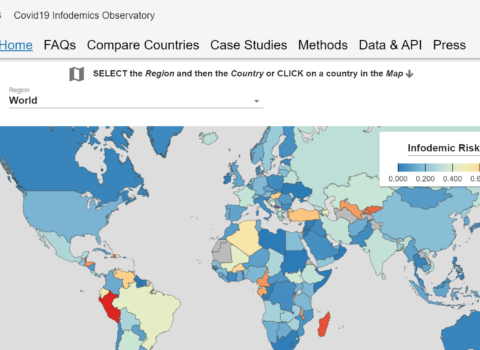Mass screening is effective in containing Covid-19 infections. Published by the journal Scientific Reports The Study on the South Tyrol case
A research recently published in the prestigious scientific journal Scientific Reports shows that screening campaigns with rapid antigen tests to detect asymptomatic positives in the population are useful. Coordinated by FBK-Irvapp Director Mirco Tonin, together with fellow professors at the University of Bolzano, Davide Ferrari and Steven Stillman, the study, carried out using the data from the experiment conducted in South Tyrol in November 2020, indicates a significant lowering of infections (-45% in the infection growth rate) in the following weeks.
In November 2020, the population of the province of Bolzano was invited by local institutions to take part in a mass screening campaign on a voluntary basis, which lasted for one weekend (20-22). The operation – organized by the South Tyrol Healthcare System and the Civil Defense Agency in cooperation with municipalities, volunteer fire brigades, the White Cross and the Red Cross – mobilized the entire local area: 362,050 people over the age of 5 were able to take the test in about 300 facilities throughout South Tyrol. When the screeinig was over, 3,615 were found positive to the test and consequently isolated. In the following months, South Tyrol plummeted among the dark red regions in Europe (those with the highest infection rates per 100,000 inhabitants), and this contributed to raising quite a few questions about the actual usefulness of mass screening.
Now, one of the most-cited open access journals in the world, Scientific Reports from the Springer Nature group, has published the research resulting from the work of three University of Bozen professors (Davide Ferrari, statistician, Mirco Tonin and Steven Stillman, economists) that presents the clarity of numbers countering impressions and pointing out that the development of the pandemic would have been even worse should the mass test not have been conducted. In the paper entitled Assessing the Impact of COVID-19 Mass Testing in South Tyrol using a Semi-parametric Growth Model, the three professors show – based on a statistical approach that allows for comparisons with similar Italian territories in terms of virus transmission dynamics and containment measures put in place, excluding screening–that the weekend of mass testing carried out in South Tyrol yielded more than positive results.
“The approach we took in our study is based on models that compare changes over time in a place where a certain intervention is carried out with those that occur in the same time frame in similar places but where no intervention has taken place,” said Prof. Davide Ferrari, “by doing so, we were able to isolate the impact of the mass testing campaign in South Tyrol from national policies on freedom of movement, business and school closures, and sanitation measures, since, during the same period, no other measures that differed from the rest of the country and that could justify a decline in the trend of infections had been implemented in the province of Bolzano.”
According to the three professors’ estimates, overall, the mass screening campaign in South Tyrol resulted in a decrease in the growth rate of Covid-19 infections by 45% compared to what would have been observed if no testing had been conducted. “Specifically, we ascertained that, without the screening, at 7, 10, 20, and 40 days from the date of intervention, we would have had a further increase in cases of infection by 17, 22, 26, and 51 percent, respectively,” added co-author Steven Stillman.
“The effectiveness of this type of intervention depends on citizen participation, and it is important to note that this great impact was achieved even though the test was voluntary, a sign that the population understood its importance,” Mirco Tonin pointed out.
Free University of Bolzano Press release




